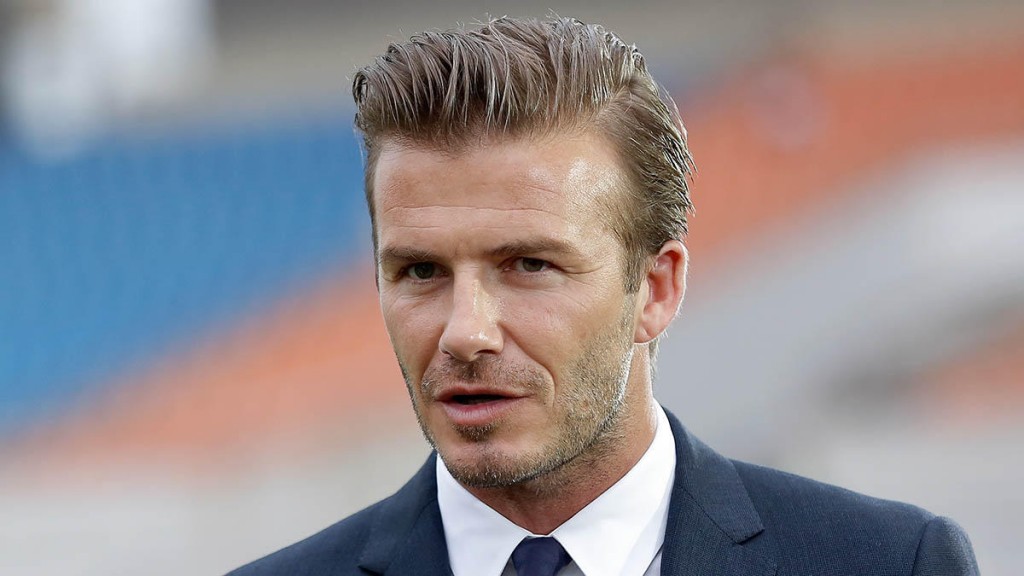As a footballer, David Beckham had it all – the looks, the successful wife, the family, the stylish suits and the big-money deals. But with his boots hung up, the earnings continue to grow. We now look at the inner workings of the Beckham business machine.
On a warm, late-spring evening in Paris, tears are rolling down David Beckham’s face. It’s a private moment witnessed by millions. Emotion overtook the Paris Saint-Germain midfielder as he faced every footballer’s greatest fear. An East Londoner whose fame outgrew his considerable talent, realising that his sport – which in two decades made him a multi-millionaire – no longer had a place for him.
Unlike Beckham’s Hollywood career narrative, taking him to the greatest football clubs in the greatest leagues (not to mention Preston North End and LA Galaxy), things didn’t end with a stunning free-kick or trademark assist. Rather, a tear-stricken veteran being skinned in the build-up to an irrelevant Brest goal in an end-of-season stroll. Before being substituted.
As the fourth official held a board indicating the famous No.23 was to be substituted, Beckham ceremoniously embraced the Parisian ovation and each team-mate, as his wife and parents wiped their eyes alongside Nicolas Sarkozy in the stands. A slow walk to the Parc Des Princes touchline, and the dashing prince of modern football was gone.
After 834 games, 146 goals and a few high-profile red cards, Beckham had – at 8.42pm on 18 May 2013 – officially retired.
But there are retirements. And there are retirements. Fast forward 18 months, when US business magazine Forbes reported the biggest annual earnings of Beckham’s career, a barely comprehensible £48m (£15m more than his previous best in 2012), making him the second-highest-paid retired sportsman in the world – behind Nike billionaire Michael Jordan. With business assets in fashion, beverages, leisure and a sporting franchise in development, 2015 could see him crack the $100m (£64m) mark. This, despite having not kicked a ball competitively since leaving that pitch in Paris.
New Ventures
“I was a footballer for 22 years but the success I had created something for me off the field as well,” said Beckham recently. “This is a passage of my life where I’m going into the business world. It’s a different kind of excitement to stepping on the pitch. Nothing will, or can, replace that.”
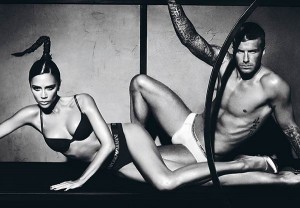
And yet, at 40, Beckham has never been busier. He left football a champion – the 2013 French title his tenth and final league medal. As a player, he was distinguished by incredibly accurate delivery allied to a tremendous work ethic. Off the field, he was marked by an underestimated ability to seize an opportunity to heighten his profile.
Upon seeing the Spice Girls’ “Say You’ll Be There” video in 1996, he ambitiously informed team-mates that “Posh” was the woman he would marry. Significantly higher profile at the time, Victoria provided David with a springboard to fame beyond football’s confines.
The former England captain was always a master manipulator of image, whether being suspiciously conspicuous in so many goal celebrations, or simply making a provocative style choice. His 2003 decision to leave Manchester United for Real Madrid came when being a Galactico was the ultimate accolade for superstar footballers (as opposed to actual trophies, as his one in four La Liga seasons testifies). Even the LA Galaxy move was a calculated risk – thrusting him into football’s final frontier but also the American mass consciousness.
Retirement from professional sport is just the next step in the Beckham journey, and it is now allowing him to explore his entrepreneurial ambitions, switching attention from familiar endorsements (two decades with Adidas, one with Coty’s Beckham fragrances) to expansive ventures in new markets. “Timing is everything,” says Paul Smith, CEO of celebrity marketing analysts Repucom. “Moves to Real Madrid and LA Galaxy were timed to perfection, where his profile was established in ideal conditions to either be among football’s elite, or as an ambassador for a growing sport. Choosing LA provided Beckham with the chance to position himself among Hollywood’s A list.”
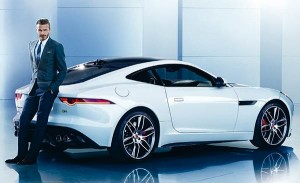
Beckham, never short of ambition in his playing career, is no longer satisfied simply selling his image to H&M or Breitling, or closer to home with Sky Sports and Sainsbury’s. In 2014, he negotiated a retail partnership with Hong Kong giants Global Brands Limited to control a 50 per cent stake of a range of lifestyle brands built around his image and influence. “Beckham increasingly plays a significant role in his business ventures,” says Kurt Badenhausen, senior editor of Forbes. “Yes, he will use his own likeness to promote his partners but he increasingly wants to control equity stakes in deals instead of just being the face of a product.”
Not that the face isn’t still one of his key assets. October 2014 saw Beckham riding through the Scottish Highlands doing his best Daniel Craig impression for Haig Club whisky. The Guy Ritchie advert (Skyfall reimagined with hipsters and Alt-J) heralded the re-launch of the single-grain whisky distillers, into which drinks giants Diageo had pumped £70m – plus secured Beckham as a “strategist”. His partnership echoes hip-hop entrepreneur Sean Combs’ association with Ciroc vodka, which netted Diddy over £38m from Diageo in 2014 alone.
Revitalising a low-key brand to attack the high-end spirit market is a major challenge, but the presence of Beckham opens lucrative, hard-to-crack territories such as China, where he is already the face of Jaguar, the Chinese Super League and China Auto Rental. Repucom, who analyse public perception of celebrities across global markets representing over 1.6 billion people, rank Beckham as their No.1 celebrity for endorsements and trendsetting, particularly in new overseas territories. “In the UK, his profile since retirement has noticeably dropped,” says Smith. “In the US, however, retirement has had the reverse effect. In 2008, only 81.6 per cent of Americans knew who he was but around his retirement in 2013, awareness spiked at 88.9 per cent. This huge jump shows that his MLS gamble has certainly paid off and is paying dividends. He is today one of the most marketable celebrities on the planet.”
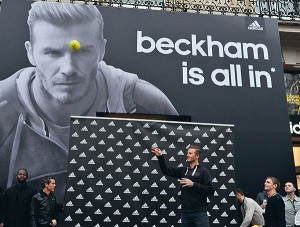
Team Beckham
Aware of this crossover appeal, Beckham has been able to negotiate better deals by offering brand direction in addition to endorsement. But this is something that was only achievable via a painstakingly constructed public and commercial image. Behind every great man is, they say, a great woman. And behind the Beckhams is an even greater team of public relations and marketing gurus.
Victoria has been integral to Brand Beckham, not just in forming one half of the celebrity package but also financially rivalling her husband since moving into fashion. Her self-titled fashion label has twice been named Brand of the Year at the British Fashion Awards and generates over £60m a year in revenue.
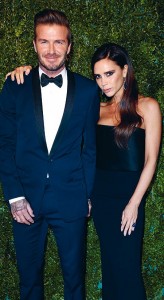
The ups and downs of their marriage have been well documented, but their relationship works symbiotically to support each other’s post-music and sport careers. Footwork Productions Ltd, whose sole revenue is the “exploitation of David Beckham’s name and image rights”, was set up in 2003, following his split with agents SFX. Victoria, as company secretary, ensures David, as employee, is paid almost the entirety of profit (£14.1m in 2013).
Team Beckham is now bolstered by a new generation, with the rising public profiles of aspiring footballer Brooklyn, 17, and Burberry model Romeo, 13. Central to the 40-year-old’s commercial strength is his ability to switch between the roles of family man, sex symbol, sports star and Hollywood matinee idol. “His personality now represents maturity, a man who can already look back at an illustrious career,” says Repucom’s Paul Smith. “He can play the father figure, his family name is now intrinsic in the world of fashion and his sons are becoming celebrities in their own right. As they grow, so too will David’s ‘legacy’.”
“Team Beckham” was originally coined by Simon Fuller – the sports and entertainment entrepreneur – who recognised that together, David and Victoria could grow a brand way beyond the confines of sport and music. Infamous for creating Pop Idol and the Spice Girls, Fuller became their key advisor with his two management companies, 19 and XIX, overseeing most of their career moves since 2003.
The enigmatic Fuller, born in Hastings but raised on an army base in Ghana, conquered the sporting world in a way few appreciate. He manages Britain’s biggest stars, such as Andy Murray and Sir Bradley Wiggins, and secured Steve McManaman’s ground-breaking Bosman transfer out of Liverpool. Far more than just a Mr 10 Per Cent, Fuller holds an equal partnership in the Haig Club and Global Brands deals, bringing the vision and acumen where Beckham brings image and influence. It was Fuller who negotiated Beckham’s 2007 LA Galaxy transfer, which not only opened the US commercial market but also the opportunity for their most ambitious and challenging project yet: the launch of a Miami MLS franchise.
Taking Miami
Even today, David Beckham’s LA Galaxy deal drops jaws. Among the huge figures (£155m for an initial five years), a clause passed almost unnoticed containing an option to purchase an MLS franchise for a discount £16m.
Eight years on, this appears a masterstroke, given the £38m Manchester City paid – with the New York Yankees baseball team – to launch their New York City expansion in 2013. Beckham’s choice of Miami also looks shrewd, with South Florida’s soccer-mad two million-plus Hispanic population an instant potential fanbase. At the franchise unveiling in February 2014, it certainly seemed Beckham was back in the game.
“Sport remains at the core of what Beckham represents,” Forbes’ Kurt Badenhausen believes. “The plan was always likely to be selling a chunk of his MLS franchise to capitalise on the discounted option he has to buy. But he would remain an owner and a significant part of the franchise going forward.”
Yet 16 months since that initial fanfare, Beckham remains “frustrated” with the inability to secure the most important asset for any new sport franchise: a stadium.
A spectacular 25,000-seater seafront location was rejected as “inappropriate” by the city mayor, while red tape held up efforts to find another space to develop plans are now well underway to build Beckham and Fuller’s dream stadium [Previously, the ground share options were unappealing, with Miami Dolphins’ 75,540-seat Sun Life Stadium and the local university’s 20,000-seater being too big and too underdeveloped respectively].
It had originally been been a rare and chastening defeat for Team Beckham, who are used to doors swinging open at the mention of the B-word. But they stayed quiet, with little public lobbying, and worked through local opinion seems and the political complexity of Florida State politics.
Thankfull the MLS are no longer getting twitchy safe in knowing thaBeckham is still a huge asset to the league. Ultimately, Miami is just another business opportunity for Beckham. While the situation would be enough to drive many to reach for a bottle of Haig Club, ultimately he would walk away before being dragged into a very public failure. ‘It’s been fun’
Despite this, with a growing business empire and a brand that grows stronger with each new social-media account and venture launched, it would take a brave person to bet against Beckham Empire succeeding in Miami. Whether we will again see him involved in English football, given he declares “no interest” in coaching or management, is up for debate. But then, Beckham is no longer English property.
A global money-making machine, with a clearly defined idea of his own brand and a handpicked team around him, every action he takes will be strategised. He’s not quite Richard Branson yet, but David Beckham is a man with a plan. Whether it’s cars and airlines next – as Repucom predict – or something unexpected, it will most likely be another victory for the man who walked from that Paris pitch in tears.
Retirement, in his own words, has “been fun so far”. In excess £130m-worth of fun, to be exact.
Source: MAN London

